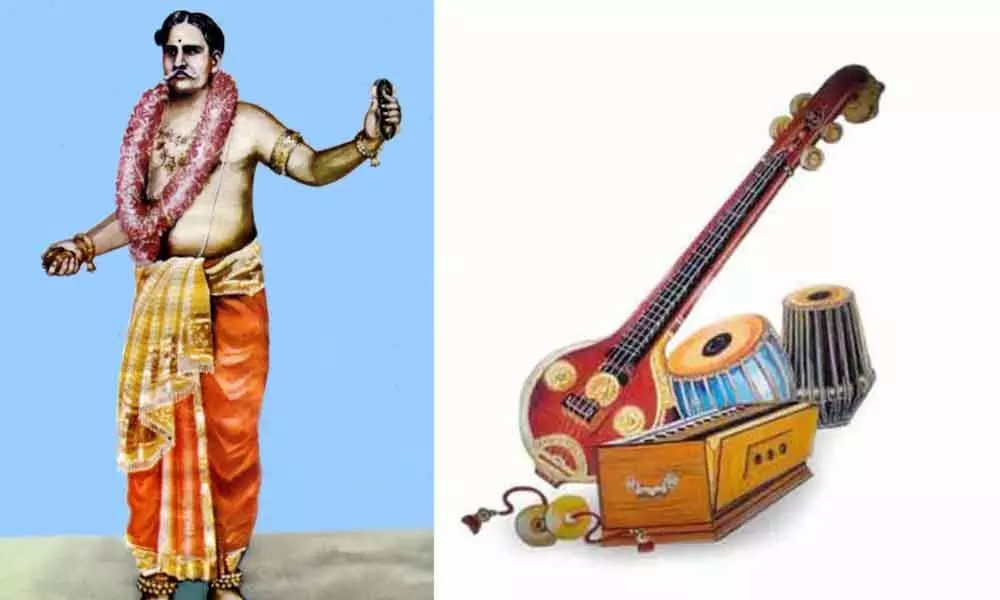'Harikatha Pithamaha' Adibhatla Narayana Das: A brief look into his life and work

Born on 31 August, 1864, in Ajjada, a tiny village in the present Vizianagaram district of Andhra Pradesh, Adibhatla Narayana Das was the creator of modern school of Harikatha; a unique and stylised storytelling that uses narration and music.
Born on 31 August, 1864, in Ajjada, a tiny village in the present Vizianagaram district of Andhra Pradesh, Adibhatla Narayana Das was the creator of modern school of Harikatha; a unique and stylised storytelling that uses narration and music. Das was also a noteworthy musician, a dancer of repute, a poet of rare eminence and he added a new dimension to Telugu and Sanskrit literature with his harikathas, prabhandas, translations and avadhanams.
Apart from being a child prodigy with rich retentive memory, Das was a versatile genius and great scholar in quite many languages; Persian, Arabic, Hindi, Sanskrit, Telugu, and English. Das was not only an innovator of composite art of Harikatha liked by one and all – learned and ignorant, imbibing the 'Nava Rasas' the nine emotions that form the basis of abhinaya (acting or performance), but also a great master in bringing out all the niceties of music and mance, bringing out his literary talents in many languages known to him i.e.
In 1883, Kuppuswamy Naidu Bhagavatar from South visited Vizianagaram and gave Harikatha performance and Das was present in the audience. It was a rendition of 'Dhruvacharitra'. Inspired by the art form, unknown until then in Andhra state, and realising its potential, Das decided that he would become a 'Haridas'. And since then, he has been a wanderer, entertaining huge masses of people with his dance, music and abhinaya that were the prominent features of his Harikatha. Sarojini Naidu, 'Nightingale of India', who witnessed his Harikatha during the All India Congress Mahasabha held in Kakinada in 1923, was full of appreciation. Das was undoubtedly a supreme master of rhythm, which is an integrated art comprising of Nritya, Geeta and Vadya, the three together constituting his Sankeerthanam. His veena playing was original and remarkable. Known as 'Laya Brahma', he was a nightmare to the accompanists especially the Mridangist.
He gave quite a number of both Veena and Harikathas performances. In the court of Mysore Maharaja, he stole the heart of the king as well as the scholars with his expertise in playing Veena and received felicitations. The Maharajah presented him with a veena as was pleased not only with his music, but also with his speedy and faultless English translation of his story and description. He also recorded Das' voice through phonogram and used to listen to it frequently.
The newspaper reports of his Mysore performance made Das more widely known. On his return from Mysore Maharajah of Vizianagaram appointed him as 'Asthana Vidwan' of royal court.
Among his literary feats, mention must be made of Ashtavadhanam performances where people used to come in droves and buy tickets to watch such performances. 'Navarasatarangini', 'Rubayat of Omarkhayam' and 'Tarakam' are other evidences of his literary conquests.
In 1919, HH Vijayarama Gajapati, Maharajah of Vizianagaram opened Music College 'Sri Viayarama Ganapatasala', first of its kind in entire South India. Das was appointed as the first Principal and presided over for about 20 years. Under his able stewardship the college grew from strength to strength and talented musicians came out of this prestigious college.
Das penned over 20 Harikathas. His Sanskrit works include 'Harikathamrutam', a compilation of three Harikathas, 'Tarakam' (an original allegorical poem) and few Shatakas.
Notable disciples of Narayana Das were: Vajapeyajula Subbayya Dasu, Neti Lakshminarayana Bhagavatulu (Vijayawada), Nemani Varahala Dasu, Vedanabhatla Venkata Ramanayya, Vadlamani Narasimha Dasu.
Das has had the unique honour of Gajarohana procession multiple times during his triumph and tours in Andhra and Telangana, which was considered to be a great honour conferred on great artistes, .
Noble Laureate, Rabindranath Tagore, who heard Das' Harikathas had rightly acknowledged that there was none like Narayandas in singing Behag, Bhairavi and Kalyani in the whole of India.
The veteran poet and poet Laureate of Andhra Pradesh 'Satavadhani' Chellapilla Venkata Sastry paid rich tributes to Das' literary achievements. He said Narayana Das" is the only man who deserves to be called as a 'Kalaprapurna'. "Das' art is like a rose poetry, dance and music".
Das passed away on January 2, 1945, on the same thithi of 'Pushya Bahula Panchami', the day on which Saint Thyagaraja Swamy also reached heavenly abode.














